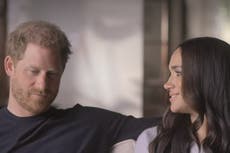Harry chose to leave royalty behind – blaming Meghan always had an ulterior motive
As the Duke and Duchess of Sussex’s Netflix series concludes, the truth about their departure from the royal family is clearer than ever. But there’s a reason why so many continue to unfairly blame Meghan, writes Nicole Vassell


Harry and Meghan’s Netflix documentary series has continued to set the record straight. For years, large swathes of the British media have formed their own stance on what led the pair to quit as senior royals and move to the United States. Coined “Megxit”, the couple’s move to live a more independent life was instantly positioned as solely Meghan’s doing. In this version of events, Prince Harry had been strong-armed into leaving behind his family and a way of life he loved by his “controlling” American wife. Because it couldn’t possibly have been of his own accord.
Harry and Meghan, which has just concluded on Netflix, tells a different story. In episode six – which is streaming now – we see Harry happily aboard his “freedom flight” to California. With a wide grin on his face, it’s not quite the expression of a man uncertain of his choice. While Meghan’s mistreatment by the British press may have been the final push to make his decision, Harry had long felt unhappy with his position. Archive footage shows that even as a child he’d been puzzled by the presence of paparazzi during holidays and family celebrations, and the fact that by virtue of his birth his life was constantly up for public consumption.
Of course, this urge to attribute a man’s actions to a woman is a standard example of misogyny. Harry knows it, too. “How predictable that the woman is to be blamed for the decision of a couple,” he notes in the series. “In fact, it was my decision. She never asked to leave. I was the one that had to see it for myself, but it’s misogyny at its best.” In placing Meghan, a mixed-race woman, as the architect of their departure, the “Megxit” narrative also served to regurgitate the racist trope of Black women being aggressive and overly forceful. It also shone a light on how uncritically the wider public holds the royal family.
Many of the Sussexes’ critics would find it hard to imagine that someone so entrenched in royalty could want a life outside of it. Unless, that is, an outside force had convinced him. To accept that Harry had agency in his decision to leave is to accept that the royal family isn’t the harmless, harmonious symbol of British civility that we’ve always been told it is. It’s something many people are unwilling to recognise.
Race is a frustrating thing to try to discuss in the UK at the best of times. Those who point out the systemic prejudices that impact millions are often accused of being overly sensitive, or of being snowflakes with chips on their shoulders. But when mentioning it in the context of the royal family, the brick wall of ignorance is built even higher.
The uncomfortable truth is that the royal family’s inherited wealth today is a direct result of the actions of the British Empire. Through violence and subjugation lasting more than 400 years, Britain invaded and brutally destabilised other countries – the majority of which are home to Black and brown people. Though the nations that suffered under British invasion and rule are still recovering from the effects today, there is little evidence that modern Britain is appropriately acknowledging it.
Britain is a country that fails to own the historical atrocities that it’s spearheaded, so it’s no surprise that it continues to stick its head in the sand at the mere suggestion of racial bias in modern life. You needn’t look back further than last month for an example. After Ngozi Fulani, the CEO of domestic violence charity Sistah Space, spoke out about a racist encounter at Buckingham Palace with Prince William’s godmother Lady Susan Hussey – who has since resigned from her honorary position as a lady in waiting for the royal household and offered her “profound apologies” – the charity was forced to suspend operations owing to the amount of abuse it had received.
It’s far easier to write off Harry’s rejection of the royal machine as the work of Meghan than it is to properly grasp the nastiness that exists at its root. Royalty is built on the idea of inherent supremacy. It’s not a place Meghan could ever have lasted in.
How much longer people choose to ignore the issues of a fundamentally exclusionary institution leading British society is left to be seen. But when one of its main branches voluntarily breaks away, it’s a glaring indication that the royal family deserves much deeper scrutiny – even if what’s uncovered makes for painful reading.



Bookmark popover
Removed from bookmarks